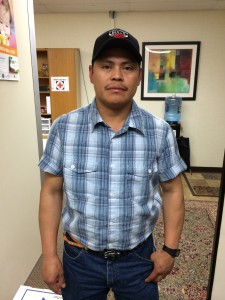
Juan Gabriel Mejia has been in the U.S. two years and six months. So far he’s seen the insides of three kitchens, towers of dirty dishes, and a seemingly endless cycle of row crops. He went to San José once, and picked up a Chicago Bulls cap he likes to wear, even though he’s never been to Chicago.
“They used to say in Guatemala that this was a place you didn’t even need to work to earn money. That’s not true,” says Mejia, shaking his head.
The 28-year-old left Olopa, his hometown in the mountainous region of Chiquimula in May 2012 to find work in the U.S. to support his parents, wife and three young children. He found plenty of it, first in Santa Cruz and then in Pescadero.
As he describes his manic schedule, it’s hard not to wonder when he sleeps and eats.
“In Santa Cruz, I worked 4 p.m. to one in the morning washing dishes. And I had another job washing dishes at another restaurant from 4 a.m. to 12:30.
“Here I work in the field six days a week, nine and a half hours a day. I work at Duarte’s washing dishes four days a week; starting at 6:30 p.m. It’s a 6-hour shift.
“On Sundays, I work at Cindy’s in Pescadero (Pescadero Country Store) 7 a.m. to 1 p.m. and then at Duarte’s at night.”
Mejia has three nights off. He spends two of them learning English through Puente’s ESL program. He spends the last one doing laundry 35 miles away in Santa Cruz, since his housing barracks don’t have a washing machine.
Mejia has a brother in town who followed him from Guatemala. They work at the same farm, but Mejia’s schedule is so tight that they barely speak from week to week.
Yet Mejia’s placid face betrays none of the stress and exhaustion his American life has wrought. “It’s a lot of work,” is what he says, spreading his hands in a gesture of acknowledgment.
The only time he smiles is when he describes his children: 9-year-old Wilson, 4-year-old Cindy, and 2-year-old Juan Gabriel, who is named after the father he hasn’t met yet. Mejia had to leave a month before his son was born. And he would like to stay here and continue earning money until 2018, little Juan Gabriel will be a strapping 6-year-old by the time he gets to hug his dad.
At least his kids will all be in school, thanks to tuition he’ll provide. “While I’m here I want to help them study,” he says.
Mejia has set an excellent example with his own commitment to learning English. When he came to the U.S., he didn’t know a single word. When waiters at his restaurant in Santa Cruz would ask him for a ‘fork’ or a ‘plate,’ he would stare at them blankly.
But when he came to Pescadero, some friends brought him to La Sala for a hot meal. That was where he learned of Puente’s services, and decided it was time for him to challenge himself.
Now, thanks to Puente’s comprehension-based English curriculum and a lot of hard work, Mejia has a burgeoning vocabulary.
“I work in the field. I harvest leeks, and I harvest fava beans,” he says slowly and carefully in English.
And then, in Spanish: “Puente’s really helped me with my English. Also, I think the services at La Sala are very good.”
Back home, Mejia is not a farm worker – he’s a farm owner. His father Andrés plants beans and corn on a few small plots of land Mejia purchased since moving to the U.S. The food feeds the whole family.
Constant scrimping and saving enabled him to send money home to buy farmland and build a new house for his parents. Next, he intends to build a house for his wife and children. He’ll join them there, and farm his own land, when he returns to Olopa.
For more information about Puente's adult education programs, email Omar Ortega.
